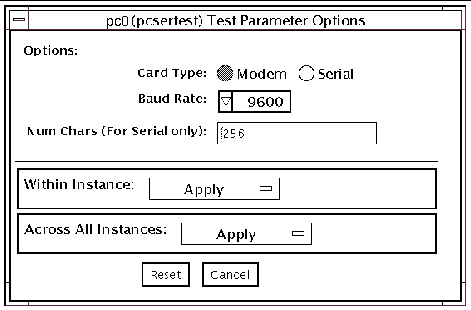PCMCIA Modem Card Test (pcsertest) |
PCMCIA is a technology that provides small, easy to use peripheral devices. PCMCIA stands for Personal Computer Memory Card International Association. It is a PC Card standard for mobile computing I/O cards. These cards range from memory, FAX/modems, serial I/O, SCSI, video, sound, and so on.
The
pcsertest
verifies the functionality of PCMCIA modem card and PCMCIA serial I/O socket card. It does not test any other PCMCIA devices.
The
pcsertest
issues a series of commands to the modem to initiate a local analog loopback test and verifies this functionality.
As an option, the
pcsertest
tests serial I/O socket cards. This test writes a pattern of incrementing data to the serial I/O socket card, which is then looped back, read and verified.
|
Note - When testing serial I/O socket cards, a 9-pin loopback connector is required. However, no loopback connector is required when testing the default modem card. See Appendix A for loopback connector wiring instructions.
|
pcsertest Options
To reach the dialog box below, right-click on the test name in the System Map and select Test Parameter Options. If you do not see this test in the System Map, you might need to expand the collapsed groups, or your system may not include the device appropriate to this test. Refer to the
SunVTS User's Guide
for more details.
FIGURE 40-1 pcsertest Test Parameter Options Dialog Box

TABLE 40-1 pcsertest Options
|
pcsertest
Option
|
Description
|
|
Card Type
|
Specifies the type of device you are testing; either a PCMCIA modem, or a PCMCIA serial I/O socket card.
Note-If you choose the Serial card type, and there is no serial I/O socket card in the slot, the test fails.
|
|
Baud Rate
|
Specifies the baud rate for testing.
|
|
Num Chars
|
Specifies the number of characters being used for external loopback testing of the serial socket card. By default, this is set to 256 characters. This option is applicable only to serial socket cards and ignored for the modem card.
|
|
Note Note - Any combination of modem and socket I/O cards can be placed in the PCMCIA slots. However, you must select the correct type of card in the Options dialog box. If you select an incorrect card type, the test fails. The default card type for each PCMCIA slot is a modem card. If only one modem card is plugged in, the empty slot is ignored.
|
pcsertest Test Mode
TABLE 40-2 pcsertest Test Modes
|
Test Mode
|
Supported?
|
Description
|
|
Connection
|
No
|
Not supported.
|
|
Functional
(Offline)
|
Yes
|
Runs the full set of tests.
|
pcsertest Command-Line Syntax
/opt/SUNWvts/bin/pcsertest
standard_arguments
-o dev=
device_name
, type=
card_type
,baudrate=
speed
,numchars=
n
TABLE 40-3 pcsertest Command-Line Syntax
|
Argument
|
Description
|
|
dev=
device_name
|
Specifies the device name (for example,
dev=pc0
and
dev=pc1
)
|
|
type=
card_type
|
Specify one of the two card types for the device (
type=
serial
or
type=modem
). You do not need to specify the type if the device is a modem, since modem is the default card type.
|
|
baudrate=
speed
|
Specifies the communication speed. Specify one of the following:
9600
19200
38400
57600
The default is
9600
.
|
|
numchars=
n
|
Specifies the number of characters to use for external loopback testing of the serial socket card. By default, this is set to
256
characters. This option is applicable only to serial socket cards and ignored for the modem card.
|
|
Note Note - 64-bit tests are located in the sparcv9 subdirectory: /opt/SUNWvts/bin/sparcv9/testname. If a test is not present in this directory, then it may only be available as a 32-bit test. For more information refer to 32-Bit and 64-Bit Tests.
|
|
SunVTS 5.0 Test Reference Manual
|
816-1667-10
|




|
Copyright
© 2002, Sun Microsystems, Inc. All rights reserved.
